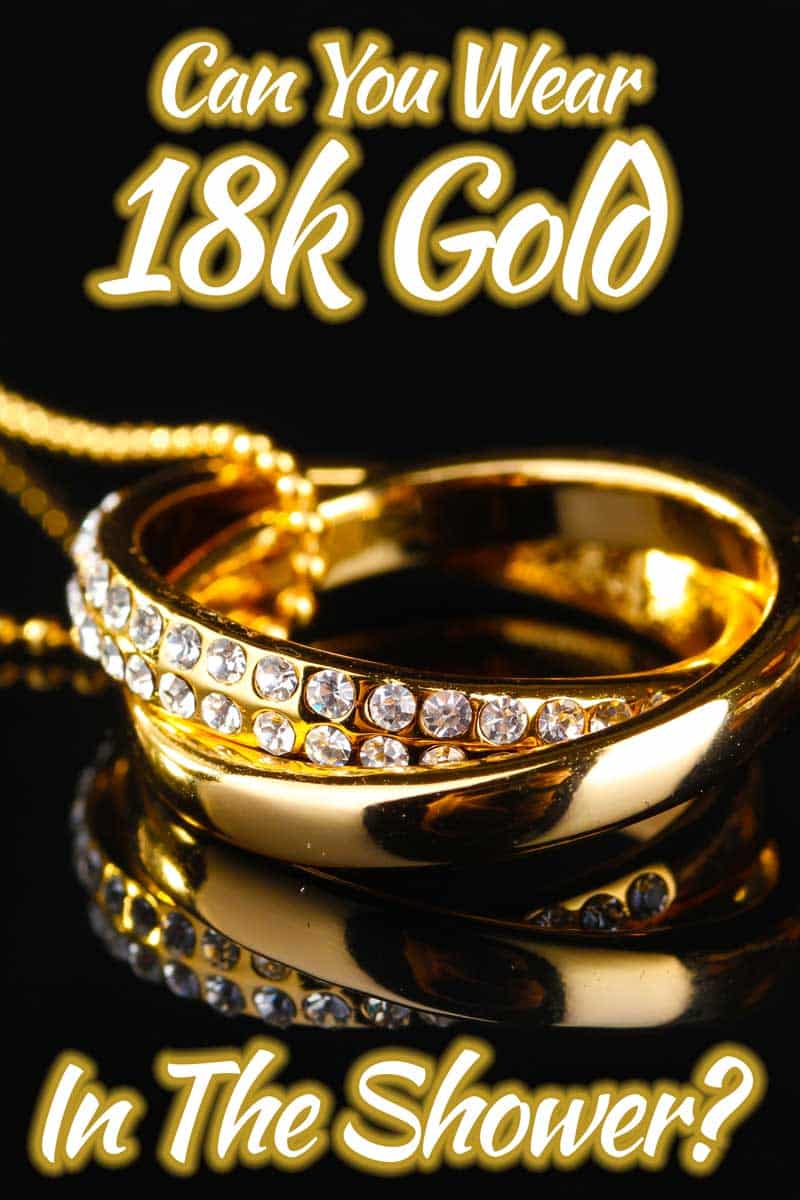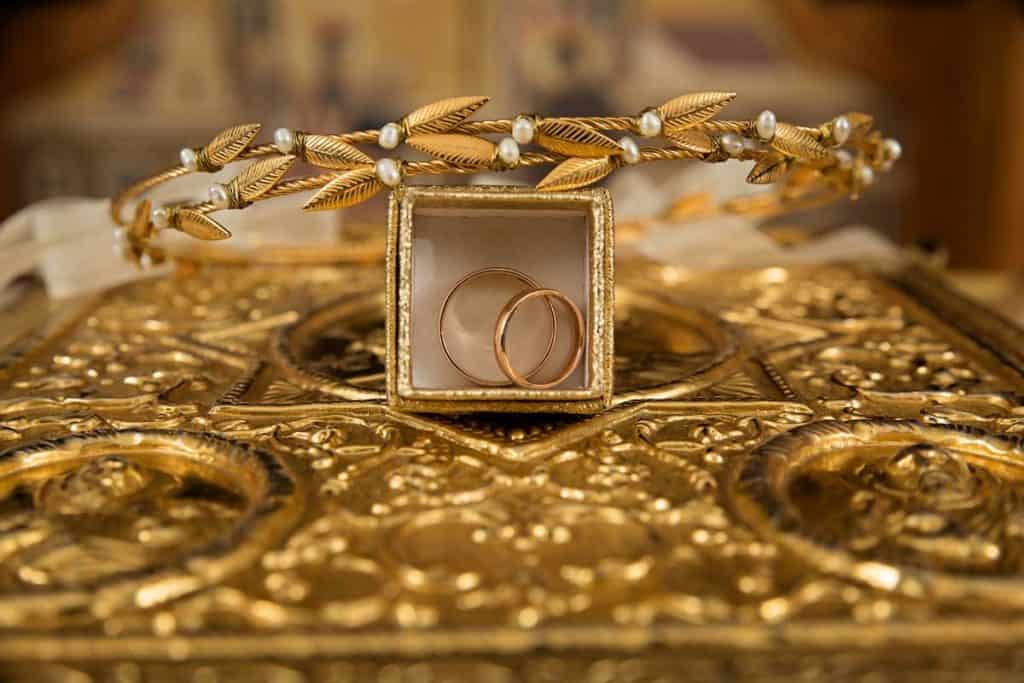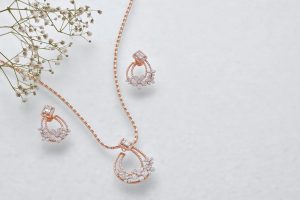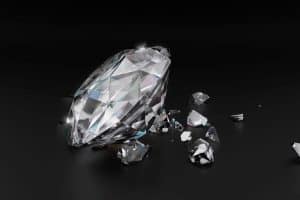
This article may include affiliate links and elements that were carefully created by our team using advanced ai to help you envision the best style advice.
You can wear your 18k and other solid gold pieces in the shower, but it isn’t highly recommended. Water will not damage the metal itself, but it can reduce the shine. Repeated encounters with water may change its appearance over time.
So that’s a good general rule for 18k and most other varieties of solid gold. But let’s talk specifics! Keep reading for all the details so you can make the best decision for your jewelry care.
Should You Wear Your 18K Gold in the Shower?
As we mentioned above, while you can wear your gold in the shower, you really should not if you want to keep it looking its best. Soap and water, particularly hard water, can leave a residue on gold that dulls its color and shine.
It’s certainly possible to re-polish the pieces and bring the shine back, but why bother necessitating the extra work? Gold already lasts for an extensive amount of time, and leaving your pieces off when you shower will keep them looking like new for even longer.
What's the Difference Between 18K Gold and Other Types of Gold?
Let’s talk karats. Karats are the measure of the purity of gold, with pure gold measuring 24k. So when we see 18k gold, this means that of 24 total parts, 18 are made of pure gold and the remaining 6 are made of various other metals. These metals are added to strengthen the gold because pure gold is too soft to make into jewelry.
18k is typically the highest karat number you’ll see in gold jewelry, though some will craft pieces with 22k. But 18k is considered the highest number that is practical for jewelry. It’s about as close to pure as you can get without being uselessly malleable. As the karat number decreases, the resulting alloy becomes stronger and more durable, but the rich gold color starts to dull and become less saturated with the addition of more metals.
Additionally, those with sensitive skin should be aware of which metals are mixed into gold pieces of varying karats – some metals like copper, silver, and iron that may be present in 18k and other golds can cause allergic reactions for some people. This risk increases as the karat number decrease, due to the heightened amount of differing alloys added.
Does 18k Gold Turn Skin Green?
The reason any jewelry turns your skin green is that one or more of the metals oxidize and start to tarnish, staining your skin in the process. Metals may oxidize due to either a reaction to the acids in your skin or a reaction to a product that has come in contact with your skin, like a soap or lotion.
That being said, pure gold will not stain your skin. Gold is one of the lease reactive elements – it doesn’t combine with oxygen or dissolve in most acids. But as karat numbers decrease, the number of additional metals in your gold pieces increase and these new metals are more likely to oxidize against your skin. Metals like copper, nickel, and zinc are often added to strengthen pure gold, any of which may react to acidity. Copper, in particular, is known for giving skin that green tinge.
Naturally, the purer a gold piece is, the less likely it is to stain your skin. So 18k gold is far less likely to stain your skin than 14k or 10k, as it is 75% pure gold and only 25% other metals.
Can You Wear Any Gold Jewelry in the Shower?
Again, it really isn’t recommended to shower with any kind of gold jewelry. You can do it, and your solid gold pieces won’t suffer much, but they will eventually dull at best and become slightly corroded at worst. The various alloys that may be mixed with your gold jewelry will all react differently to repeated exposure to water. Only pure gold would be guaranteed to remain unaffected in water, and we’ve discussed that pure gold is far too soft to be used to craft jewelry.
Can You Wear Gold-Plated Jewelry in the Shower?
Gold-plated jewelry is a definite no go for the shower. Gold-plated refers to jewelry crafted with a very thin layer of gold covering a base metal like sterling silver or copper. These pieces are sturdy and mimic the appearance of solid gold, but the thin layer of gold can get chipped or rubbed off fairly easily under trying conditions. The more frequently that gold-plated pieces are submerged in or repeatedly exposed to water, the more likely it is that the gold layer will wear off completely. No one wants that!
Does Saltwater Damage Gold?
Nope! Pure gold is unaffected by saltwater. But several other metals can be negatively affected by saltwater, and some of these metals are used to strengthen gold jewelry pieces. So once you get into different karat levels, there are some types of gold that won’t fare as well as swimming in the sea.
On that note, aside from karat numbers, there are also types of gold distinguished by color rather than by karat. The color of gold can change because – you guessed it – the various alloys added have their own colors as well. So we have rose gold, yellow gold, and white gold.
A perfect example of salt water’s different effects is rose gold versus yellow or white gold. Rose gold takes on its reddened hue because it’s an alloy of gold and copper, and copper's rich color floods into the gold. While rose gold is actually the strongest of the three colors, copper is so easily corroded by salt, so these pieces won’t last long at all in salty conditions. Yellow and white gold, on the other hand, contain alloys like nickel or zinc. They will still be affected by salt but not nearly as quickly.
Moral of the story – it’s generally best to keep your gold jewelry of any variety out of the ocean.
Does 18k Gold Fade?
The possibility of fading is another topic that depends somewhat on the color of gold or the types of metals mixed in. In general, 18k gold doesn’t fade. 18k yellow gold definitely won’t fade, while 18k white gold may fade to a slightly yellower hue over time. But even that should be easily fixed by a quick polishing.
Does Gold Last Forever?
Pure gold, yes. Pure gold is indestructible – it does not corrode, rust or tarnish. It can’t be destroyed by fire, it can only be melted. All the gold that has ever been harvested from the earth is still in existence, is still able to be reused and repurposed today. But we know at this point that virtually no jewelry is crafted of entirely pure gold. Most gold jewelry of varying karats has a lifespan of up to 30 years before starting to look a bit run-down, but even then the wear will be minimal.
There you have it! A good general rule for your 18k and other gold pieces is to go ahead and take them off before showering, and definitely before swimming in the ocean or a pool. After all, even if water won’t immediately damage your jewelry, why risk eventual adverse effects? Gold is such a beautiful element, and we might as well take care to keep it shining for as long as possible.




